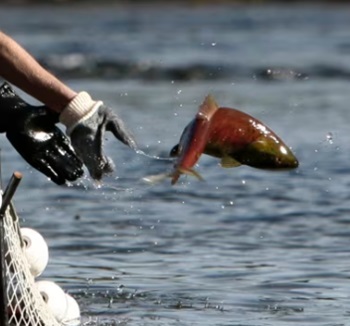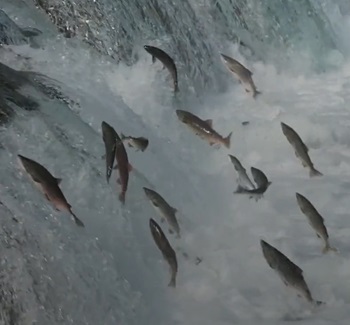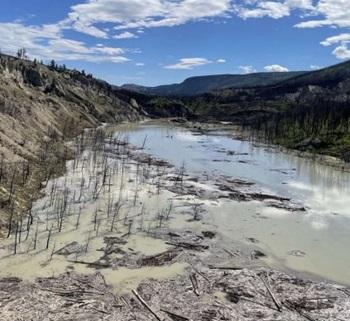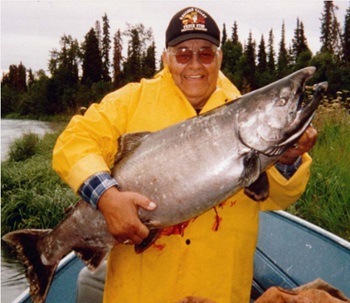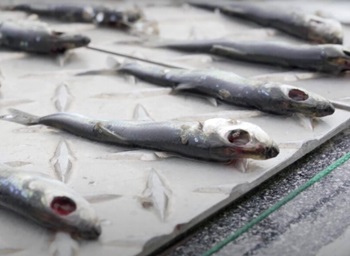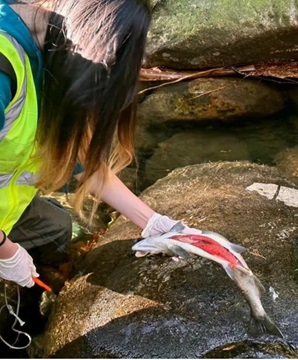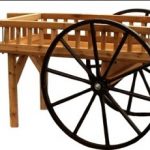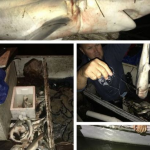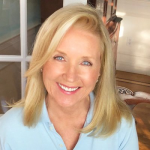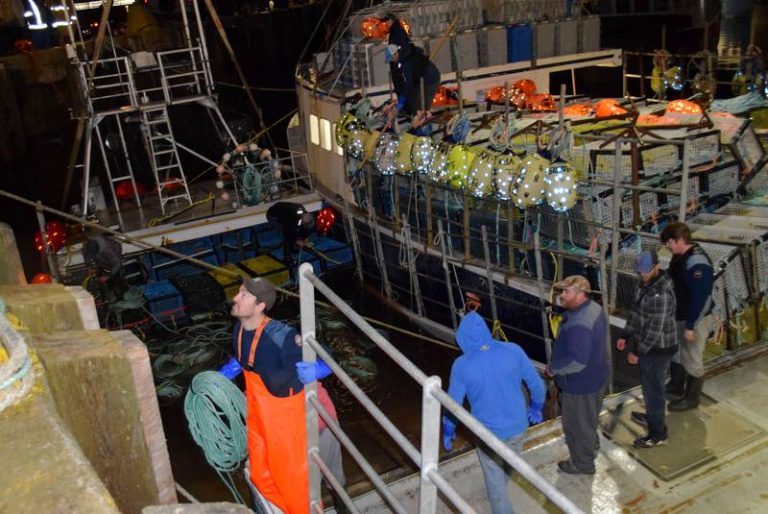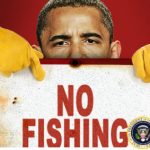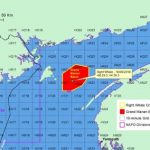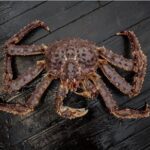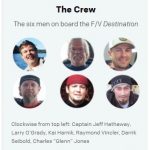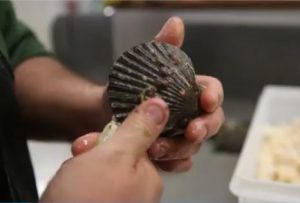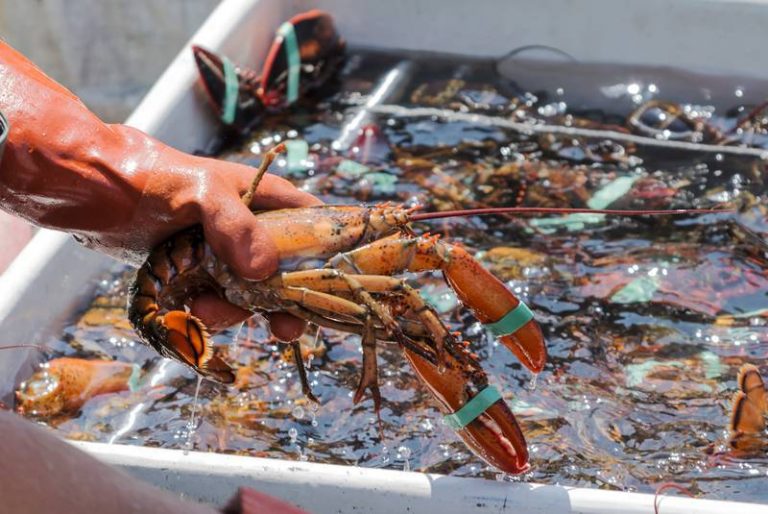Tag Archives: British Columbia
Canadian government to build conservation hatchery in Prince George to boost Chinook and sockeye salmon recovery
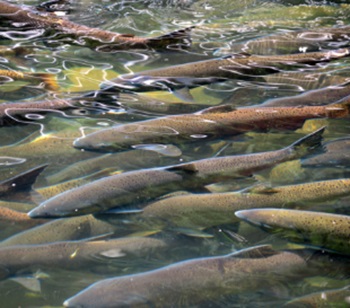 The Canadian federal government has announced plans to build a new Pacific salmon hatchery in Prince George, British Columbia (B.C.). This initiative, supported by the Pacific Salmon Strategy Initiative (PSSI), aims to bolster the conservation and recovery of wild Chinook and sockeye salmon populations. Operated by Fisheries and Oceans Canada (DFO) in partnership with the Lheidli T’enneh First Nation and Canfor Pulp Ltd., the hatchery will be constructed this fall on federal land along the Nechako River, near its junction with the Fraser River. “As a Nation, fisheries are central to the work we do,” said Chief Dolleen Logan, on behalf of Lheidli T’enneh First Nation. “We remain committed to maintaining biodiversity in our traditional territory while enhancing salmon populations throughout the region.” more, >>CLICK TO READ<< 13:02
The Canadian federal government has announced plans to build a new Pacific salmon hatchery in Prince George, British Columbia (B.C.). This initiative, supported by the Pacific Salmon Strategy Initiative (PSSI), aims to bolster the conservation and recovery of wild Chinook and sockeye salmon populations. Operated by Fisheries and Oceans Canada (DFO) in partnership with the Lheidli T’enneh First Nation and Canfor Pulp Ltd., the hatchery will be constructed this fall on federal land along the Nechako River, near its junction with the Fraser River. “As a Nation, fisheries are central to the work we do,” said Chief Dolleen Logan, on behalf of Lheidli T’enneh First Nation. “We remain committed to maintaining biodiversity in our traditional territory while enhancing salmon populations throughout the region.” more, >>CLICK TO READ<< 13:02
B.C. commercial fisherman fined $33K for harvesting catch in unique reefs
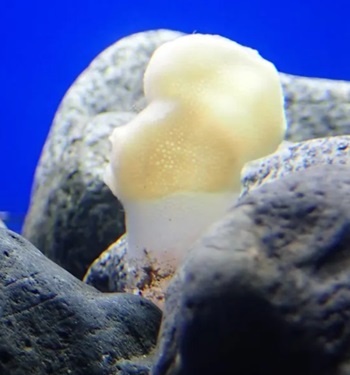 The owner of a commercial halibut vessel in British Columbia received more than $33,000 in fines for fishing in a marine protected area containing glass sponge reefs unique to the waters of the Pacific Northwest. Fisheries and Oceans Canada says a provincial court judge handed down the fine in May to Brent Belveal, who pleaded guilty to offences under the Fisheries Act. It says Belveal, operator of the vessel Gypsy Soul, harvested and sold his illegal catch from within the Queen Charlotte Sound Glass Sponge Reef Marine Protected Area near Bella Bella off B.C.’s central coast. The department describes the reefs as “globally unique ecosystems.” more, >>CLICK TO READ<< 10:39
The owner of a commercial halibut vessel in British Columbia received more than $33,000 in fines for fishing in a marine protected area containing glass sponge reefs unique to the waters of the Pacific Northwest. Fisheries and Oceans Canada says a provincial court judge handed down the fine in May to Brent Belveal, who pleaded guilty to offences under the Fisheries Act. It says Belveal, operator of the vessel Gypsy Soul, harvested and sold his illegal catch from within the Queen Charlotte Sound Glass Sponge Reef Marine Protected Area near Bella Bella off B.C.’s central coast. The department describes the reefs as “globally unique ecosystems.” more, >>CLICK TO READ<< 10:39
Fishing communities welcome B.C. intention to reform licensing and quotas
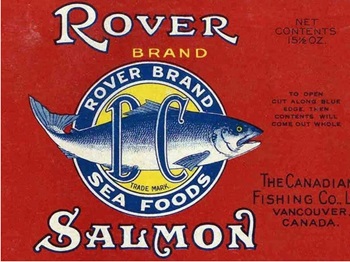 As part of the Coastal Marine Strategy unveiled last week, the province says it’s moving toward an owner-operator system for quota and licences. Under the new system, licence and quota holders would also need to be active fish harvesters — something advocacy groups and First Nations have been requesting for years. A transition to an owner-operator system would aim to eliminate the ability of a few giants to stake a majority claim on B.C.’s fishing grounds. One company alone, Jim Pattison’s Canfisco, owns double-digit percentages of some fish quotas, worth tens of millions of dollars. An owner-operator system is not a novel concept in the country. Atlantic Canada has had one in place for years, and as a result, has lower costs compared to B.C. more, >>CLICK TO READ<< 08:21
As part of the Coastal Marine Strategy unveiled last week, the province says it’s moving toward an owner-operator system for quota and licences. Under the new system, licence and quota holders would also need to be active fish harvesters — something advocacy groups and First Nations have been requesting for years. A transition to an owner-operator system would aim to eliminate the ability of a few giants to stake a majority claim on B.C.’s fishing grounds. One company alone, Jim Pattison’s Canfisco, owns double-digit percentages of some fish quotas, worth tens of millions of dollars. An owner-operator system is not a novel concept in the country. Atlantic Canada has had one in place for years, and as a result, has lower costs compared to B.C. more, >>CLICK TO READ<< 08:21
Mass mortality: A fish scientist follows a tip about die-offs at B.C. salmon farms
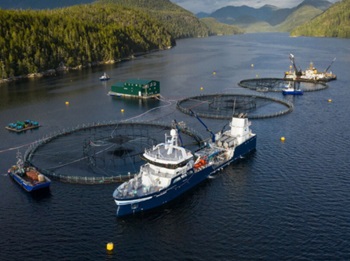 A tipster had told Proboszcz, a fisheries biologist at Watershed Watch Salmon Society, that salmon farms off the coast had been experiencing mysterious and massive die-offs and nobody was saying anything about it. “Yeah, it was a little crazy,” said Proboszcz of his decision to make the long trip. “But he didn’t know why they were dying.” Before Proboszcz left, a colleague had tracked a number of boats that were allegedly bringing fish all the way around the south end of Vancouver Island and into the Nanaimo area. But the boats had nearly finished shuttling all the fish, according to the anonymous source. Desperate, Proboszcz had tried to hire a skiff and even a helicopter to see what was going on. But nothing worked out, and so he decided to take matters into his own hands. Photos, more, >>CLICK TO READ<< 14:25
A tipster had told Proboszcz, a fisheries biologist at Watershed Watch Salmon Society, that salmon farms off the coast had been experiencing mysterious and massive die-offs and nobody was saying anything about it. “Yeah, it was a little crazy,” said Proboszcz of his decision to make the long trip. “But he didn’t know why they were dying.” Before Proboszcz left, a colleague had tracked a number of boats that were allegedly bringing fish all the way around the south end of Vancouver Island and into the Nanaimo area. But the boats had nearly finished shuttling all the fish, according to the anonymous source. Desperate, Proboszcz had tried to hire a skiff and even a helicopter to see what was going on. But nothing worked out, and so he decided to take matters into his own hands. Photos, more, >>CLICK TO READ<< 14:25
Canada to ban open-net pen salmon farming in British Columbia
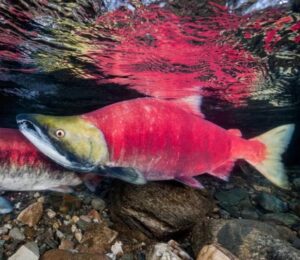 “Today, we are delivering on that promise and taking an important step in Canada’s path towards salmon and environmental conservation, sustainable aquaculture production, and clean technology,” said Jonathan Wilkinson, natural resources minister. There are dozens of the farms in British Columbia. More than half of wild salmon stock populations are declining in the province’s waters, according to the Pacific Salmon Foundation. Opinion polls have shown a majority of residents in British Columbia support ending open-net salmon farming, while more than 120 First Nations in the province have shown support for land-based closed containment fish farms. more, >>CLICK TO READ<< 09:27
“Today, we are delivering on that promise and taking an important step in Canada’s path towards salmon and environmental conservation, sustainable aquaculture production, and clean technology,” said Jonathan Wilkinson, natural resources minister. There are dozens of the farms in British Columbia. More than half of wild salmon stock populations are declining in the province’s waters, according to the Pacific Salmon Foundation. Opinion polls have shown a majority of residents in British Columbia support ending open-net salmon farming, while more than 120 First Nations in the province have shown support for land-based closed containment fish farms. more, >>CLICK TO READ<< 09:27
Meet one of the young faces of Steveston’s spot prawn industry
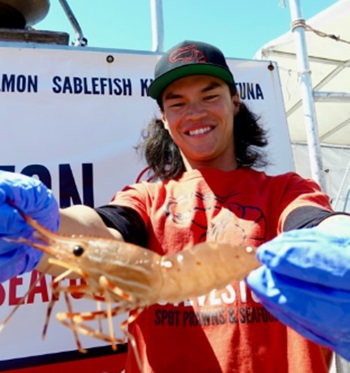 The best part of spot prawn season, according to Reid Thornton, is the “tight-knit” community. Now in his fifth season, the 21-year-old Steveston resident started working in the industry fresh out of high school. Thornton is the sales manager and a deckhand at Steveston Spot Prawns & Seafood. With the exception of Thornton himself, most employees in the company are third-generation Japanese-Canadian fishermen. He had heard of spot prawns prior to starting his job, but he had no idea about the extent of its popularity. more, >>CLICK TO READ<< 06:38
The best part of spot prawn season, according to Reid Thornton, is the “tight-knit” community. Now in his fifth season, the 21-year-old Steveston resident started working in the industry fresh out of high school. Thornton is the sales manager and a deckhand at Steveston Spot Prawns & Seafood. With the exception of Thornton himself, most employees in the company are third-generation Japanese-Canadian fishermen. He had heard of spot prawns prior to starting his job, but he had no idea about the extent of its popularity. more, >>CLICK TO READ<< 06:38
The hunt for B.C.’s most notorious fisherman
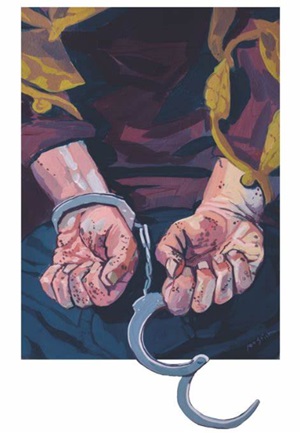 On a Coast Guard patrol ship in nearby English Bay, Leslie Sanderson was awoken and briefed about a boat that might be fishing where it shouldn’t be. Through binoculars, a crew member quickly spied the suspect vessel, which was lit only by headlamps worn by the shadowy figures on board. The boat was listing slightly, with a trap-hauling line extending into the water. Strewn about the deck were traps containing about 250 Dungeness crabs, one of the most lucrative products in B.C. salt water. It was a haul worth several thousand dollars. Sanderson quickly identified the skipper, wrestled him to the deck, yanked off the man’s heavy fisherman’s rubber gloves and handcuffed him. The DFO had caught Scott Steer. Again. more, >>CLICK TO READ<< 11:04
On a Coast Guard patrol ship in nearby English Bay, Leslie Sanderson was awoken and briefed about a boat that might be fishing where it shouldn’t be. Through binoculars, a crew member quickly spied the suspect vessel, which was lit only by headlamps worn by the shadowy figures on board. The boat was listing slightly, with a trap-hauling line extending into the water. Strewn about the deck were traps containing about 250 Dungeness crabs, one of the most lucrative products in B.C. salt water. It was a haul worth several thousand dollars. Sanderson quickly identified the skipper, wrestled him to the deck, yanked off the man’s heavy fisherman’s rubber gloves and handcuffed him. The DFO had caught Scott Steer. Again. more, >>CLICK TO READ<< 11:04
You’re Young and Want to Make It Fishing? Good Luck
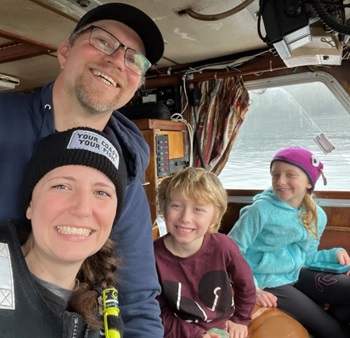 Duncan Cameron is a fisherman, like his dad and his dad’s dad before him. They count themselves among the scores of families who have made their livings on the water, pulling riches from the deep. But today, Cameron says young fishers like him are being priced out. Cameron is part of a group of fishers, conservationists and politicians who say independent owner-operators like himself are increasingly competing with big money to get a finite number of government licenses and quota they need to fish. Today, some of those licenses are worth hundreds of thousands or even more than a million dollars, something Cameron said has allowed major corporations to control a growing stake in a public resource. photos, more, >>click to read<< 07:27
Duncan Cameron is a fisherman, like his dad and his dad’s dad before him. They count themselves among the scores of families who have made their livings on the water, pulling riches from the deep. But today, Cameron says young fishers like him are being priced out. Cameron is part of a group of fishers, conservationists and politicians who say independent owner-operators like himself are increasingly competing with big money to get a finite number of government licenses and quota they need to fish. Today, some of those licenses are worth hundreds of thousands or even more than a million dollars, something Cameron said has allowed major corporations to control a growing stake in a public resource. photos, more, >>click to read<< 07:27
Keeping an Industry Afloat – Thomas Goulding’s Cork Mill
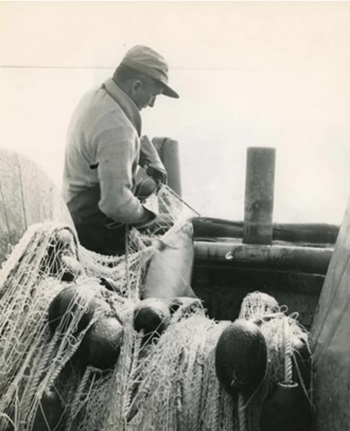 Plastic floats have taken over the market since the 1950s, but before then fishing floats were almost exclusively made of cork or wood. The wooden ones were known as “cedar corks” and the only commercial supplier of them on the West Coast was Thomas Goulding who produced them in his Cork Mill at the Acme Cannery on Sea Island. The Acme Cannery was built in 1899, part of the boom in cannery construction during the late 19th and early 20th centuries to take advantage of the seemingly unlimited supply of salmon available in the Fraser River. In 1902 it was absorbed into the British Columbia Packers amalgamation. In 1918 it closed, but the buildings, net racks and moorage were maintained for the community of fishermen, mostly Japanese, who lived around it. In a small building on the west side of the cannery Mr. Goulding set up the cork mill. The building and all the equipment for the mill, the saws, the lathes, the reamer, the stringer and the tar vat were all hand-built by him with help from his Japanese Neighbours. Photos, maps, more, >>click to read<< 13:38
Plastic floats have taken over the market since the 1950s, but before then fishing floats were almost exclusively made of cork or wood. The wooden ones were known as “cedar corks” and the only commercial supplier of them on the West Coast was Thomas Goulding who produced them in his Cork Mill at the Acme Cannery on Sea Island. The Acme Cannery was built in 1899, part of the boom in cannery construction during the late 19th and early 20th centuries to take advantage of the seemingly unlimited supply of salmon available in the Fraser River. In 1902 it was absorbed into the British Columbia Packers amalgamation. In 1918 it closed, but the buildings, net racks and moorage were maintained for the community of fishermen, mostly Japanese, who lived around it. In a small building on the west side of the cannery Mr. Goulding set up the cork mill. The building and all the equipment for the mill, the saws, the lathes, the reamer, the stringer and the tar vat were all hand-built by him with help from his Japanese Neighbours. Photos, maps, more, >>click to read<< 13:38
B.C. seeks $6 million in properties allegedly tied to illegal crab-sales scheme
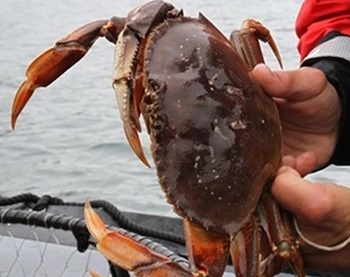 The B.C. government is seeking forfeiture of properties valued at more than $6 million that it alleges were tied to a scheme to sell illegally crabs that were meant for food for First Nations. In a lawsuit filed in B.C. Supreme Court, the province alleges that two commercial properties in Richmond, a house in Vancouver and a pickup truck, are the instruments and proceeds of “unlawful activity” linked to the illegal crab-sales scheme. Named in the suit are Jamin Chiong, who sold the crab to seafood wholesaler Million Ocean Seafood Ltd., and the owners of that company, Tsz Wah Fok, Peng Lin and Tak Yi Tong. None of those named in the suit have responded and the allegations have not been proven in court. more, >>click to read<< 18:47
The B.C. government is seeking forfeiture of properties valued at more than $6 million that it alleges were tied to a scheme to sell illegally crabs that were meant for food for First Nations. In a lawsuit filed in B.C. Supreme Court, the province alleges that two commercial properties in Richmond, a house in Vancouver and a pickup truck, are the instruments and proceeds of “unlawful activity” linked to the illegal crab-sales scheme. Named in the suit are Jamin Chiong, who sold the crab to seafood wholesaler Million Ocean Seafood Ltd., and the owners of that company, Tsz Wah Fok, Peng Lin and Tak Yi Tong. None of those named in the suit have responded and the allegations have not been proven in court. more, >>click to read<< 18:47
‘It’s definitely precedent setting:’ commercial prawn operator fined $250K
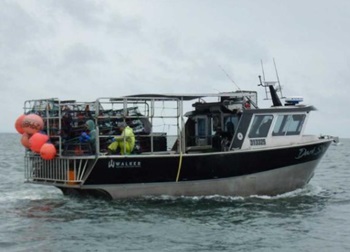 Prawning in an environmentally sensitive area off the lower Sunshine Coast resulted in a heavy fine and fishing gear seizure against a Delta man. A recent provincial court sentencing hearing in Sechelt followed the conviction of 13 violations under Canada’s Fisheries Act against Dean Keitsch in connection to incidents in July 2020 off the coastal community on board his vessel Dark Star. Fisheries officers retrieved more than 550 prawn traps set at the bottom of the Strait of Georgia Glass Sponge Reef Marine Refuge, which is closed to all forms of bottom fishing. photos, more, >>click to read<< 07:05
Prawning in an environmentally sensitive area off the lower Sunshine Coast resulted in a heavy fine and fishing gear seizure against a Delta man. A recent provincial court sentencing hearing in Sechelt followed the conviction of 13 violations under Canada’s Fisheries Act against Dean Keitsch in connection to incidents in July 2020 off the coastal community on board his vessel Dark Star. Fisheries officers retrieved more than 550 prawn traps set at the bottom of the Strait of Georgia Glass Sponge Reef Marine Refuge, which is closed to all forms of bottom fishing. photos, more, >>click to read<< 07:05
No-farm farm
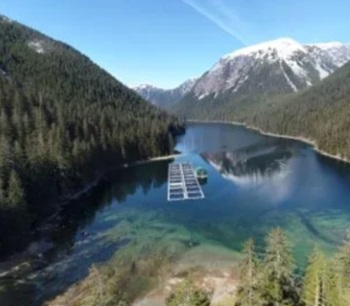 In one of the stranger twists in the strange world of global salmon marketing, Alaska’s non-farm fish farmers played a role in convincing the Canadian city of Ottawa to order removal of billboards protesting farmed salmon. The reason? “False advertising.” And now the same environmental group involved in Ottawa – Wild First – is under fire in British Columbia for running radio advertisements claiming salmon farms have pushed wild Pacific salmon to “the brink of extinction,” according to the news website Business in Vancouver (BIV). That claim is about as far from the truth as one can get. Salmon in the Pacific are today at numbers never seen in recorded history, but most of them are pink salmon. Some scientists contend this explosion of pinks due in part to the free-range fish farming efforts of hatchery operators in Alaska and Russia has reached the point where it is wreaking havoc with the entire North Pacific ecosystem. more, >>click to read<< 07:50
In one of the stranger twists in the strange world of global salmon marketing, Alaska’s non-farm fish farmers played a role in convincing the Canadian city of Ottawa to order removal of billboards protesting farmed salmon. The reason? “False advertising.” And now the same environmental group involved in Ottawa – Wild First – is under fire in British Columbia for running radio advertisements claiming salmon farms have pushed wild Pacific salmon to “the brink of extinction,” according to the news website Business in Vancouver (BIV). That claim is about as far from the truth as one can get. Salmon in the Pacific are today at numbers never seen in recorded history, but most of them are pink salmon. Some scientists contend this explosion of pinks due in part to the free-range fish farming efforts of hatchery operators in Alaska and Russia has reached the point where it is wreaking havoc with the entire North Pacific ecosystem. more, >>click to read<< 07:50
Why Fairer West Coast Fishing Needs More “Boots on Deck,” According to New Report
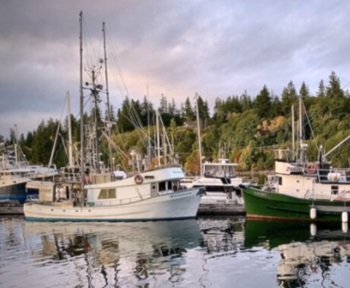 The West Coast fishing industry finds itself in increasingly troubled waters, according to a recent report from the Standing Committee on Fisheries and Oceans (FOPO). The parliamentary committee says unfair regulations and a lack of federal intervention have led to an uneven playing field for BC fishers. Unlike the Maritime provinces, where regulations limit corporate control and prioritize independent harvesters, there are no restrictions on ownership of commercial licenses and quotas on BC’s coast. As a result, owner-operators are often shut out of the process, jeopardizing their ability to make a sustainable living. “Fisheries are the fabric of our coastal communities, and they have been particularly in Indigenous communities for 10 to 15,000 years. Fish in the water are the birthright of all Canadians,” Sonia Strobel, CEO of Skipper Otto Community Supported Fishery, told us in an interview. photos, more, >>click to read<< 07:45
The West Coast fishing industry finds itself in increasingly troubled waters, according to a recent report from the Standing Committee on Fisheries and Oceans (FOPO). The parliamentary committee says unfair regulations and a lack of federal intervention have led to an uneven playing field for BC fishers. Unlike the Maritime provinces, where regulations limit corporate control and prioritize independent harvesters, there are no restrictions on ownership of commercial licenses and quotas on BC’s coast. As a result, owner-operators are often shut out of the process, jeopardizing their ability to make a sustainable living. “Fisheries are the fabric of our coastal communities, and they have been particularly in Indigenous communities for 10 to 15,000 years. Fish in the water are the birthright of all Canadians,” Sonia Strobel, CEO of Skipper Otto Community Supported Fishery, told us in an interview. photos, more, >>click to read<< 07:45
Refinancing Clearwater loan worth millions in annual cash flow for Mi’kmaw owners
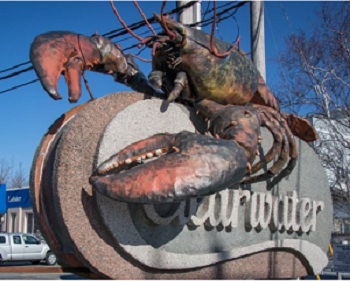 Mi’kmaw First Nations that own half of Canadian seafood giant Clearwater will finally start seeing multi-million dollar cash flows from their investment thanks to a loan refinancing that slashes interest payments. Their partner in the landmark deal, Premium Brands of Richmond, B.C., lent a coalition of seven Mi’kmaw First Nations about $240 million to cover their equity purchase of Clearwater in 2020. But the loan came with a hefty 10 per cent interest rate, according to the non-profit First Nations Financial Authority. Premium has agreed to refinance $100 million of that debt through the First Nations Financial Authority at its interest rate of 4.2 per cent, the authority said Tuesday. more, >>click to read<< 12:37
Mi’kmaw First Nations that own half of Canadian seafood giant Clearwater will finally start seeing multi-million dollar cash flows from their investment thanks to a loan refinancing that slashes interest payments. Their partner in the landmark deal, Premium Brands of Richmond, B.C., lent a coalition of seven Mi’kmaw First Nations about $240 million to cover their equity purchase of Clearwater in 2020. But the loan came with a hefty 10 per cent interest rate, according to the non-profit First Nations Financial Authority. Premium has agreed to refinance $100 million of that debt through the First Nations Financial Authority at its interest rate of 4.2 per cent, the authority said Tuesday. more, >>click to read<< 12:37
B.C. salmon farms linked to explosive spike in wild fish deaths
B.C. salmon farms killed more than 800,000 wild fish in 2022, 16 times more than the last decade’s yearly average, federal data shows. The unprecedented spike in aquaculture bycatch accounts for more dead fish in one year than the combined death toll over the previous 10 years. In one graphic example, video captured at a Cermaq facility in Clayoquot Sound shows herring floundering at the surface after getting sucked into a powerful machine meant to remove sea lice from farmed salmon. Stan Proboszcz, a senior scientist at Watershed Watch Salmon Society, said he has never seen anything like it. “All these herring that went through the hydrolicer had their eyes blown out,” Proboszcz said. “It’s horrific.” more, photos, >>click to read<< 18:07
Red herring? Facing off over the sustainability of B.C.’s herring fishery
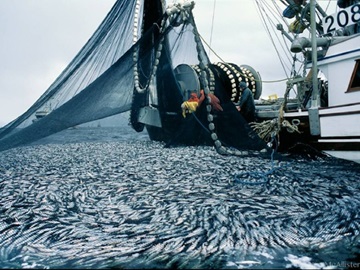 Calls for a last-minute moratorium are intensifying as the start of Pacific herring season in the Straight of Georgia approaches on Nov.24. Concerns are resurfacing among some citizens as they fear the potential impact of these fisheries on the province’s herring stock. According to Jim Shortreed, a Victoria-based herring enhancement volunteer, these numbers are unsustainable. When asked what would be the ideal biomass, the marine specialist couldn’t define the exact number. Ronnie Chickite, elected Chief of the region’s We Wai Kai Nation and herring fisherman with nearly three decades of experience, disagreed with Dixon’s assessment. >>click to read<< 08:52
Calls for a last-minute moratorium are intensifying as the start of Pacific herring season in the Straight of Georgia approaches on Nov.24. Concerns are resurfacing among some citizens as they fear the potential impact of these fisheries on the province’s herring stock. According to Jim Shortreed, a Victoria-based herring enhancement volunteer, these numbers are unsustainable. When asked what would be the ideal biomass, the marine specialist couldn’t define the exact number. Ronnie Chickite, elected Chief of the region’s We Wai Kai Nation and herring fisherman with nearly three decades of experience, disagreed with Dixon’s assessment. >>click to read<< 08:52
First Nations seek salmon return to Columbia Basin in new treaty with U.S.
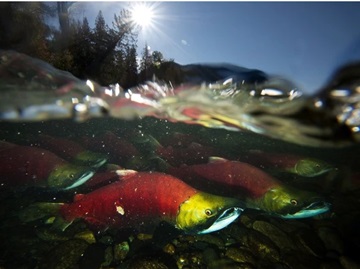 Representatives from the Ktunaxa and Syilx Okanagan nations say they continue to bring up salmon restoration in negotiations for a modern Columbia River Treaty and will not stop until a solution can be reached within or outside a new agreement. The U.S.-Canada treaty regulates the cross-border Columbia River to prevent flooding and generate hydro power. A key component of the 62-year-old treaty is set to expire in September 2024, lending urgency to the ongoing talks. “I think what we are doing in the fight to bring salmon back is vital to us moving forward,” said Lower Similkameen Indian Band Chief Keith Crow, who is a member on the Syilx Okanagan Nation’s Chiefs Executive Council and the Nation’s lead in the Columbia River Treaty talks. >>click to read<< 14:25
Representatives from the Ktunaxa and Syilx Okanagan nations say they continue to bring up salmon restoration in negotiations for a modern Columbia River Treaty and will not stop until a solution can be reached within or outside a new agreement. The U.S.-Canada treaty regulates the cross-border Columbia River to prevent flooding and generate hydro power. A key component of the 62-year-old treaty is set to expire in September 2024, lending urgency to the ongoing talks. “I think what we are doing in the fight to bring salmon back is vital to us moving forward,” said Lower Similkameen Indian Band Chief Keith Crow, who is a member on the Syilx Okanagan Nation’s Chiefs Executive Council and the Nation’s lead in the Columbia River Treaty talks. >>click to read<< 14:25
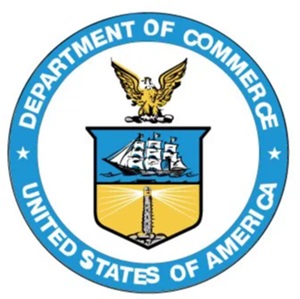
Struggling salmon fishermen getting federal help, but it may be too late
Earlier this month, two years after a request by Oregon’s governor, the U.S. Department of Commerce declared a Chinook fishery disaster for 2018, 2019 and 2020, years when local salmon populations plummeted. Fishing regulators blame the drop on poor habitat conditions and climate change near the California-Oregon border, where thousands of Chinook migrate from the ocean up rivers and streams to spawn. The disaster declaration releases financial assistance for fishermen and possibly for other businesses, along with funding to help restore the fishery and protect future Chinook runs, members of Oregon’s congressional delegation said in a statement. “The powers that be move pretty slowly when it comes to this stuff,” said Ray Monroe, a Pacific City dory fisherman. >>click to read<< 12:00
Travis Van Hill’s crew was back fishing on Okanagan Lake, but this time without their captain
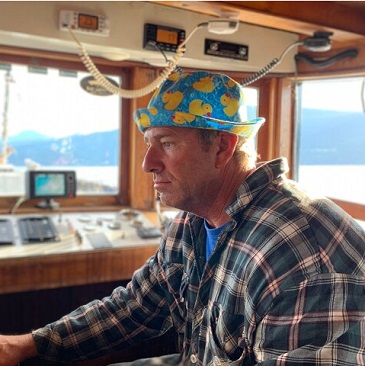 A month after Travis Van Hill’s shrimp boat capsized on Okanagan Lake, his crew took to the water for the first time. Van Hill drowned when the vessel Western Slope capsized in a windstorm on July 24. His body was recovered Aug. 16. Kim Van Hill, Van Hill’s wife, said two crew members went fishing Thursday night, for the first time without their captain. One former crew member was too traumatized by the incident to return to work. She said the crew paid tribute to Van Hill on their first night back on the water. >click to read< 10:06
A month after Travis Van Hill’s shrimp boat capsized on Okanagan Lake, his crew took to the water for the first time. Van Hill drowned when the vessel Western Slope capsized in a windstorm on July 24. His body was recovered Aug. 16. Kim Van Hill, Van Hill’s wife, said two crew members went fishing Thursday night, for the first time without their captain. One former crew member was too traumatized by the incident to return to work. She said the crew paid tribute to Van Hill on their first night back on the water. >click to read< 10:06

Body pulled from Okanagan Lake believed to be captain of fishing boat
Both men who died in a surprise wind storm on July 24 were likely pulled from a pair of Okanagan lakes on the same day. On Wednesday, the body of 26-year-old kayaker Eli Buruca was finally recovered from Kalamalka Lake. “The deceased is believed to be the 55-year old man who went missing when his boat capsized on the night of July 24,” said Cst. Chris Terleski. “However, this cannot be confirmed until a positive identification is made by the BC Coroners Service.” Van Hill was the captain of a commercial fishing boat, which capsized in Okanagan Lake near Ellison Provincial Park around 11 pm on July 24. click to read< 07:58
Missing kayaker’s body found as search moves on to shrimp boat captain
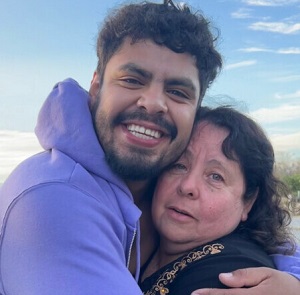 The body of a missing kayaker has been found on Kalamalka Lake. Eli Buruca went missing during a windstorm the night of July 24. Volunteer searchers located Buruca’s body in deep water at the north end of the lake and it was recovered by the RCMP Underwater Recovery Team on Wednesday, says police spokesperson Cpl. Tania Finn. “Our sincerest condolences go out to the family and friends of the deceased,” said Finn. Meanwhile, the search for Travis Van Hill continues on Okanagan Lake, near Ellison Provincial Park. Van Hill went missing during the same storm, when the shrimp boat he was on capsized. >click to read< 10:31
The body of a missing kayaker has been found on Kalamalka Lake. Eli Buruca went missing during a windstorm the night of July 24. Volunteer searchers located Buruca’s body in deep water at the north end of the lake and it was recovered by the RCMP Underwater Recovery Team on Wednesday, says police spokesperson Cpl. Tania Finn. “Our sincerest condolences go out to the family and friends of the deceased,” said Finn. Meanwhile, the search for Travis Van Hill continues on Okanagan Lake, near Ellison Provincial Park. Van Hill went missing during the same storm, when the shrimp boat he was on capsized. >click to read< 10:31
Research groups sound alarm after three whales reportedly struck by ships off West Coast
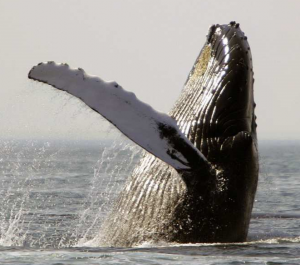 Three whales were reportedly struck by vessels in northern B.C. waters over a 10-day period last month, raising West Coast humpback researchers’ concerns over the risk shipping poses to the marine mammals. The first report involved a BC Ferries vessel, the Northern Expedition, colliding with a whale in Wright Sound near Kitimat on July 20, Fisheries and Oceans Canada (DFO) confirmed. A second incident on July 21 involved a boat that transports workers to Alcan’s Rio Tinto power generation facility in Kitimat. And a cruise ship struck a whale in Hecate Strait between Haida Gwaii and the B.C. mainland on July 29, DFO said. Shipping traffic and humpback whale populations are both on the rise, often in the same areas, escalating the risk of vessel strikes to humpbacks, the greatest threat to the species of special concern along with entanglements in fishing gear.>click to read< 17:46
Three whales were reportedly struck by vessels in northern B.C. waters over a 10-day period last month, raising West Coast humpback researchers’ concerns over the risk shipping poses to the marine mammals. The first report involved a BC Ferries vessel, the Northern Expedition, colliding with a whale in Wright Sound near Kitimat on July 20, Fisheries and Oceans Canada (DFO) confirmed. A second incident on July 21 involved a boat that transports workers to Alcan’s Rio Tinto power generation facility in Kitimat. And a cruise ship struck a whale in Hecate Strait between Haida Gwaii and the B.C. mainland on July 29, DFO said. Shipping traffic and humpback whale populations are both on the rise, often in the same areas, escalating the risk of vessel strikes to humpbacks, the greatest threat to the species of special concern along with entanglements in fishing gear.>click to read< 17:46
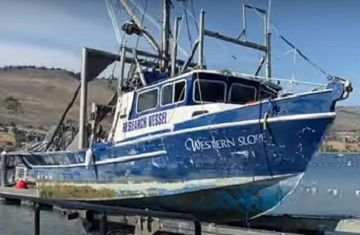
Capsized shrimp boat recovered from Okanagan Lake
The shrimp boat Travis Van Hill was working on the night he is presumed to have drowned is now out of Okanagan Lake. Crews were at Paddlewheel Park boat launch in Vernon Tuesday afternoon, dragging the formerly capsized boat out of the water. The boat has now been dry docked. Kim Van Hill, wife of the missing boat captain, says the boat will be taken away. It took two trucks to pull the vessel out of the water. Van Hill was not found on the boat when it was recovered. Some believed he had been caught in the netting pulled behind the boat, but when the netting was recovered, Van Hill was not among it. Video, >click to read< 09:47
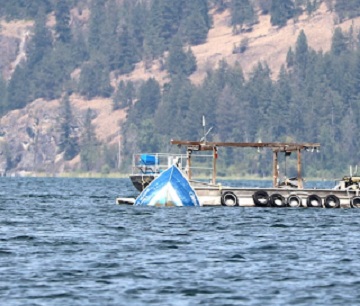
Boat recovery underway one week after B.C. man presumed drowned
Travis Van Hill’s family has been waiting for a full week now for the wreckage of his boat to be pulled from the lake. The commercial fishing boat captain went down with his vessel Monday, July 24 during a storm on Okanagan Lake. His body has yet to be located or resurface. Red tape and paperwork have prevented anyone from retrieving him or his boat, according to Travis’ family. “His body will be decomposed and won’t look like my handsome husband,” wife Kim Van Hill said. But today, Monday, July 31, appears to be the day that action may finally take place. >click to read< 16:51






